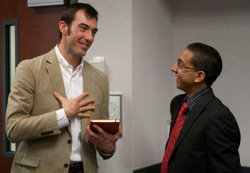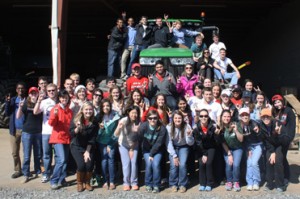Learning Lab I is an annual experience designed and implemented by first-year Park Scholars. This educational program affords students an opportunity to learn about leadership by understanding the people, history, strengths, and challenges of North Carolina through the context of a theme selected by the class.

Acknowledging the longstanding issue of food insecurity among North Carolina households, the Class of 2017 chose to explore how the state’s leaders in genetic engineering and sustainable farming are working to make food more accessible and nutritious for both North Carolina and the United States.
“I was truly inspired by the hard work that the committee put out through the entire academic year and seeing how their work came together was amazing,” said Gabbie Robbins ’17, chair of the Learning Lab I planning committee.
Prior to departing on their trip, first-year Park Scholars discussed perspectives on genetic engineering and food security with leaders representing the North Carolina Department of Agriculture, the Environmental Defense Fund, NC State’s Department of Entomology and Genetic Engineering & Society Program, and Monsanto Company. The class then met with individuals at organizations and farms in Pittsboro, Research Triangle Park, Statesville, and Winston-Salem.
Kyle Bingham ’17, vice-chair of the Learning Lab I planning committee, said he believes one of his classmates’ most valuable takeaways from the experience was “an understanding of the collaboration that occurs between large-scale farmers and corporations in agriculture.”
Alex Loflin ’17 agreed. “Some of the greatest issues we learned about stemmed from a lack of direct communication between consumers and those in agriculture and biotechnology, leading to widespread misconceptions that prevent well-informed discussions and decisions. As a result, I was challenged to reflect on my own style of communication and ways that I can successfully convey the work and mission of the groups that I’m a part of.”
Learning Laboratory I Speakers
- Catherine Feuillet, Head of Trait Research, Bayer CropScience
- Durba Ghoshal, Protein and Product Characterization Group Leader, Bayer CropScience
- Heiri Gugger, Former President of Syngenta and CEO of Paradigm Genetics
- Mike Hager, Owner, Farm Boy Farms
- Lynn Mann, Owner, Manco Dairy Farm
- Phil McLain, Owner, McLain Farms
- Laura Privalle, Global Head of Regulatory Science, Bayer CropScience
- Giles Shih, CEO of BioResource International, Inc.
- Cynthia Sollod, Director, Science and Technology Development, NC Biotech Center
- Marshall Stewart: Special Assistant to the Dean and Director for Leadership and Strategy, College of Agriculture and Life Science, NC State University
- Katie Westmoreland Vuocolo ‘04, Environmental Safety Study Director, Bayer CropScience
- Michael Weeks, Local Registration Manager, Bayer CropScience
- Allan Wenck, Head of Trait Validation, Bayer CropScience
- Iris Williams, NAFTA Market Acceptance Manager for Seeds, Bayer CropScience
posted 2014.04.29
